- Read the first exclusive extract of her new book ONLY on Mail+ here
If you don’t stop drinking it’s going to end our marriage,’ Hugo said to me.
It was the morning after his best friend’s wedding, a lovely glamorous occasion that, well, I ruined for him.
Much of the wedding is a blur. I know I kept losing my phone.
I know I became very emotional, crying, then getting angry, which was a new thing that started when I became a mum.
I’m ashamed to say I picked a fight with Hugo and tried to hit him. I was that person at the wedding who everyone is staring at, thinking, ‘Oh God, get me away from them!’
I saw it in their faces. That social pariah was me – the bad drunk.
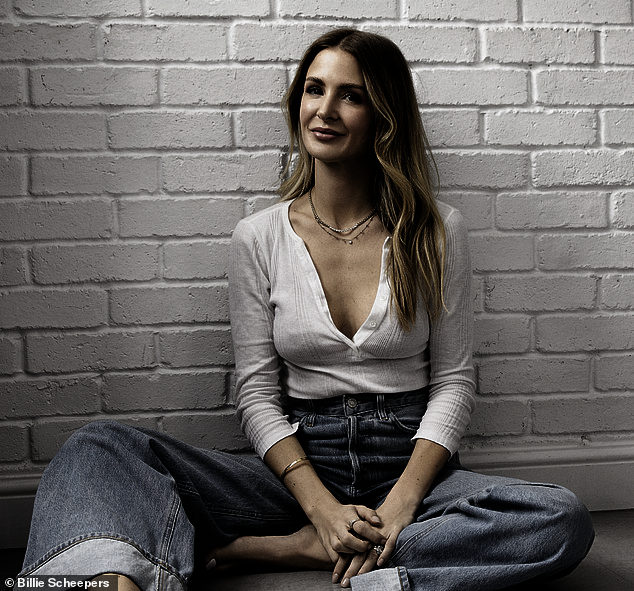
I was in the thick of my battle with alcohol when Hugo Taylor and I got married in 2018.
Still the party girl best known for her appearance on the reality TV show Made in Chelsea, where I had first met Hugo, I was still unable to control the boozing that had characterised my teens and 20s.
I found my emotions swinging between elation and panic when, a year later, I discovered I was pregnant.
But, forced to treat my body with respect, I began to really enjoy my own sober company for a change.
For years I had coped with feelings of anxiety by self-medicating with booze and the prescription sedative Xanax. It disappeared while I was pregnant, but alas came roaring back after Sienna’s birth.
Our first trip away as a new family was in the summer of 2020.
Thinking I might want to have a couple of glasses of wine, I brought expressed breast milk with me – but I still had very clear intentions not to get drunk since I knew Sienna would wake in the night for a feed.
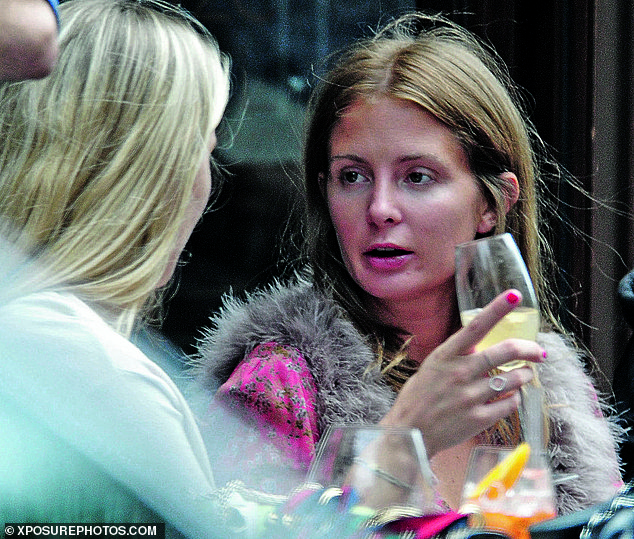
Just a few margaritas in, however, the wheels came off – and I couldn’t tell you much about the rest of the night. Luckily, Hugo was more reserved with his alcohol intake and took charge, putting me to bed and sorting out Sienna in the night.
At 4am I woke up with the most excruciating pain. It was partly the hangover, but I also had swollen, engorged breasts as I hadn’t pumped before I passed out in bed. The gurgling of the baby next to me ordinarily would have filled me with love, but in that moment all I felt was a desperate shame and self-loathing.
Not long (at all) afterwards, I was pregnant again, and by November 2021, with the arrival of Aurelia, we had two under two.
Now, instead of going out to party, I fully embraced the very British culture of yummy mummy’s wine o’clock time.
I’d see mums doing a yoga class, sipping a green juice, then posting on Instagram at 5pm about how they earned their vodka tonic that evening. It’s almost like, if you don’t need a drink before the sun goes down, you’re not mothering hard enough.
Think women are wild in their 20s? You haven’t been on a new mums’ night out, where everyone is venting about their husbands as they swig their wine, order more cocktails and post photos of themselves living their #bestlives.
I used to have my first drink during the girls’ bathtime, and I’d be excited to get them down for the night so I could have another. That was my reward. In some ways my drinking got worse when I became a mum because suddenly I could justify it; society told me I had earned it.
I was already struggling and the intensity of motherhood poured fuel on that fire. I felt like drinking was marketed directly at me as a necessary thing to cope with motherhood.
I remember one particularly rough night, when Sienna was awake with colic and I was still drinking. I was sitting on the floor crying because she wouldn’t take her bottle, and my husband had to take over, not knowing which of us he needed to help more.
I wasn’t great at communicating – especially with Hugo – and being drunk made it a million times worse. I’d become frustrated and mean, boiling over with a rage directed at him. On the mornings after those messy nights, he’d be really upset with me for hurting his feelings, but I’d either be too hungover to listen or I’d go into grovel mode, which was demeaning for both of us.
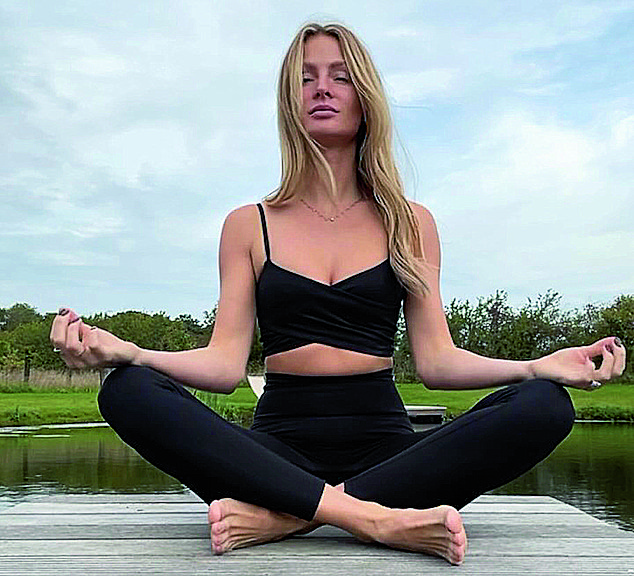
Hugo’s ultimatum after his friend’s wedding really scared me, but I think you’ve really got to want to quit for yourself, not anyone else – much though you might want to do it for a loved one.
It was a few days later that I had the wake-up call I needed. We had been invited to spend a weekend with some friends on a boat in the Mediterranean.
Everything was beautiful, sailing on crystal- clear waters. We were basically in paradise, and yet one morning I woke at 5am with a sinking feeling of dread. Minutes later, a wave of panic washed over me. My throat was really tight and I felt like I couldn’t breathe.
Terrified, I shook Hugo awake, then collapsed on to the floor. I couldn’t get air in and everything started to go black. I felt the cold fear that I would never see my two baby girls again. I really, truly believed I was dying.
Taking a sedative, I waited in terror for the grip of the panic attack to release me. It was the most intense episode I’d ever experienced and I was really shaken up, but even then I had the clarity to understand why it had happened: I was terribly hungover after multiple nights of drinking.
It was in this turmoil that I said for the first time out loud: ‘I need to stop drinking.’
It was a public declaration. Once the words had left my mouth, I knew I had to stick to them. A promise to myself, Hugo and our girls. I owed it to all of us. I was in a downward spiral of my own making and I needed urgently to stop it.
That was 25 August 2022 and I haven’t had an alcoholic drink since.
At first, it was hard to feel so raw and real. In those initial months of sobriety, I felt like I owed it to people to still be the person that they had known for years. To put on a show. But as you get older and wiser, you realise that being inauthentic in that way becomes harder and harder.
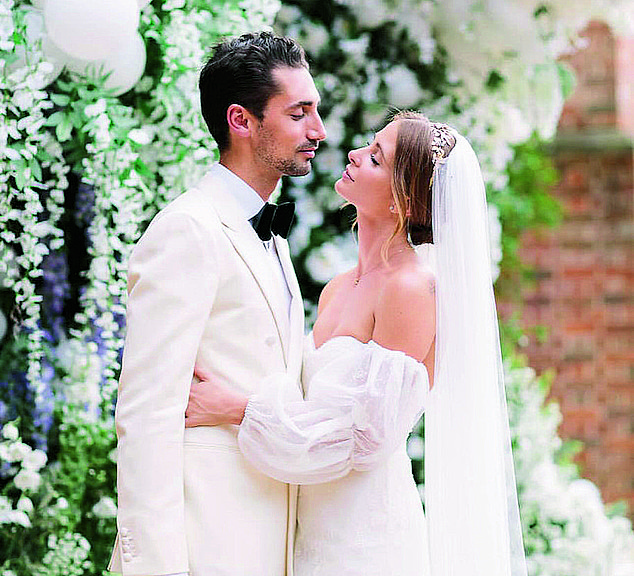
It wasn’t always sparkly-eyed rainbows and roses. I didn’t think I’d ever dance again. I didn’t think I’d be able to go to a party and have fun again. I couldn’t work out how I was going to socialise or get through a stressful social situation without a glass of Dutch courage in my hand.
I knew I would need help. A few years beforehand, on one of the many occasions I tried to make a change, an acquaintance recommended that I have a chat with a sober coach, somebody who helps you understand your relationship with alcohol.
I booked in to see him for a couple of sessions, and he really scared me with his honesty. He made it clear that if I continued to mix prescription pills and booze, it would lead me to complete destruction. So when I wanted to make the change last, I went back.
My sober coach said a helpful thing to me in one of our early sessions: ‘You’ve made the decision to put yourself first.’
I immersed myself not in that ‘wine o’clock’ banter but in sober-curious positivity. I looked for interviews with inspirational people – actors, writers and musicians who are living without alcohol.
For the first six months of my sobriety, I felt really good and was sleeping better. I learned to decide whether going to a certain event or place was an act of self-care or self-sabotage. And I learned to say no.
If I did go to something, I would make a plan: I’d arrive early and leave early and tell someone I trusted that I wouldn’t be drinking, to hold myself accountable.
Waking up knowing I didn’t do anything stupid, I didn’t create any drama, I didn’t have a fight with my husband was a priceless feeling. But slowly my anxiety started to reappear.
I wasn’t used to feeling uncomfortable, intense emotions and I was flailing for a while. The years of questionable choices had left me vulnerable because my brain was wired to want the easy way out, to want the quick fix, and I wasn’t drinking or taking Xanax so I didn’t have a way to cope.
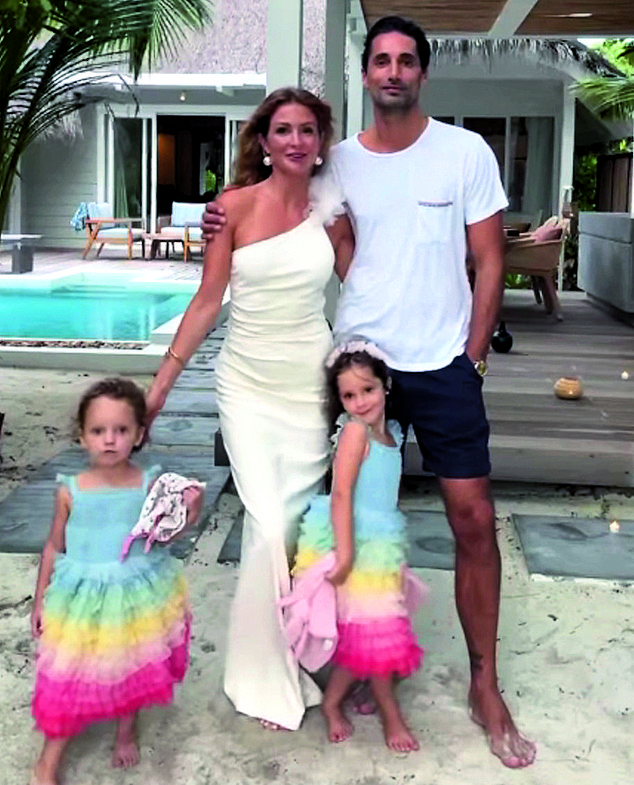
I fell into a really dark place. I had removed alcohol but the old worries became even clearer. I had what I’d describe as a burnout moment, or a nervous breakdown. I couldn’t stop crying, I was struggling to eat or sleep, I was terrified of everything and I had to take time off work. I was having panic attacks every couple of days. Every day I thought I was dying. Living alcohol-free highlighted that I could no longer avoid the work I had to do on myself.
I saw a psychiatrist and was diagnosed with generalised anxiety disorder, high-functioning depression and PTSD. (I was also later diagnosed with ADHD.) He recommended I start taking antidepressants and, after a lot of careful consideration, I decided it was the right thing for me to do. These diagnoses have helped me understand myself, and they have been crucial to my healing journey.
I also realised in therapy that a lot of my anxiety stems from my younger self wanting to be loved. I have never really loved or valued myself. The girl bullied at boarding school, the girl who was sexually assaulted at 14, the girl torn apart in the press – those parts of myself are still there, asking to be heard and comforted. I’ve become more comfortable sitting with my feelings, without any one of them defining or controlling me. I’ve got my life back.
I’m in a great place in my marriage, and I feel like myself for the first time since I was a teen. I’ve even had lots of people comment on visible improvements to my skin, hair and eyes since I stopped drinking. People have said I look younger, and I’ve lost the booze bloat around my stomach, too.
But the biggest gift of all? My closeness with my daughters. I have a new lease of life when it comes to my girls. I never wanted to be an angry, shouting parent – and it’s definitely not how I wanted my children to grow up and remember me, but too often a hangover would turn me into that person. Living without alcohol has allowed me to become the woman I want to be.
Being sober has given me a gift that I didn’t know I needed: freedom. Freedom to be myself, freedom to be the mother I want to be and that my daughters deserve, freedom to be an introvert, freedom to be healthy, and freedom not to mask any part of me with a manufactured air of confidence.
I am no longer a bad drunk. I’m a good mum, a good person. With a few tales to tell.
Adapted from Bad Drunk by Millie Mackintosh, to be published on 15 January (Piatkus, £18.99). To pre-ordera copy for £17.09 until2 February, go to mailshop.co.uk/books or call 020 3176 2937. Free UK delivery on orders over £25.
What to expect in your first sober month

By Mail on Sunday columnist and GP Dr Ellie Cannon
The first week without alcohol can feel tough because of any hangover and withdrawal symptoms.
This means that in the first few days you might feel pretty shaky, tired and headachy, and even a bit low. Your blood sugar needs to normalise and the acetaldehyde, which your body makes from clearing out alcohol, needs to pass out of your system.
The good news is that after 24 hours your blood sugar should have corrected. For most people, the withdrawal symptoms will have gone after three or four days, and this will be your first little boost. Drinking plenty of water will help you to feel more refreshed and hydrated as well.
You will start to feel less tired as your sleep should have improved. Alcohol disrupts very deep sleep, but this can normalise within the first week, which will help you to rest more.
We often underplay the effect of alcohol on the stomach. Alcohol is an irritant and affects the lining of the stomach, causing acid, heartburn, nausea, pain and even ulcers.
After just a week or two of no alcohol, the stomach has a chance to settle down and you may notice fewer stomach problems. Indigestion becomes less frequent, allowing you to enjoy food more.
By the time you have been alcohol-free for a month, you will feel quite different. Mentally, you should be thinking more clearly. You will have a greater feeling of wellbeing and less agitation. Physically, energy levels improve, sickness and nausea should have gone completely, and you might even notice some weight loss. It’s only positive from now on.
